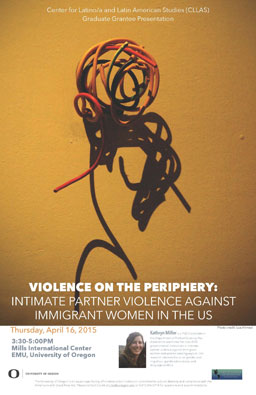Mills International Center
EMU
UO campus
CLLAS Grantee Presentation
CLLAS graduate student grantee Kathryn Miller, Department of Political Science, will talk about her research on intimate partner violence (IPV) and immigrant women, which has been supported by a CLLAS Graduate Student Research Grant.
Abstract: “There is a long history, in the United States and elsewhere, of failing to recognize intimate partner violence (IPV) against immigrant women as criminal harm. IPV continues almost unabated throughout the world, affecting all countries, cultures, and economic class. In the US, there is a decisive gap between the numbers of immigrant women facing IPV, and those afforded state amelioration (i.e. visas or grants of asylum); insofar as they exist, state responses have failed to adequately address this form of gendered violence.
Rather than viewing legal and administrative institutions in the US as well-meaning, though inept, I ask to what extent they may be directly implicated both in legitimating IPV against immigrant women, and creating the space necessary for it to continue. Given that the existence of this legal space is an essential precondition to the acts of violence themselves, how should we understand the role of US governmental institutions in IPV against immigrant women? That is, what is the relationship between state actions/inactions and the perpetuation of this form of gendered violence? This dissertation examines the ways in which categories of victimhood (e.g. ‘battered immigrant’), formed through policy and policy implementation, operate on women seeking state intervention. I hypothesize that these categories have an exclusionary and disciplinary effect on IPV survivors in two instances treated as separate in policy and the literature: 1) Women seeking asylum on account of IPV, and 2) immigrant women facing IPV in the US. I examine this through an analysis of legal processes, relevant policies and administration, court cases, and interviews with employees at NGOs that serve immigrant women. I also re-conceptualize what it means for the state to do harm in this context.”

